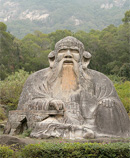|

Lao Tzu (pictured here in this statue in China) is one of the Chinese sages who, like other sages in other parts of the world, described the reality of the Self and wholeness, Totality in which everything exists, the absolute One.
|
|
by Global Good News staff writer
21 May 2010
In a new podcast available on the website of Maharishi University of Management, Dr Bevan Morris, President of the university and Prime Minister of the Global Country of World Peace, presents some of the teachings of Lao Tzu in the Tao-te Ching.
Dr Morris explained that in the ancient times of China a very great, enlightened sage named Lao Tzu (Laozi) wrote a book called the Tao-te Ching, which is a classic of the literature of enlightenment around the world.
The story goes that the reason Lao Tzu wrote down the words of this short book is because he was trying to go to India. When he tried to leave the city where he was living—the cities in those days had walls and gates—the gatekeeper said to him, ‘You cannot leave unless you write down all of your teaching, all of your wisdom of life, and leave that here with us for us to have for all times.’
‘So it was when he was trying to go to India that this great text was written down.’ Dr Morris said. ‘Some of the expressions of the Tao-te Ching are just the expressions of Vedic knowledge of India; they are just exactly the same.’
Dr Morris said that Lao Tzu describes the Tao [the Transcendent or Being] as 'infinite and eternal, present for all beings'. It is 'solitary, unchanging, infinite, eternally present. It is the Mother of the Universe. For lack of a better name, I call it the "Tao."'
Lao Tzu goes on to say 'the Tao is like a well, filled with infinite possibilities. It is empty like space, yet inexhaustible, and gives birth to infinite worlds. Every being in the universe is an expression of the Tao.'
Dr Morris explained that when Maharishi Mahesh Yogi heard this definition of Reality by Lao Tzu, he particularly liked the expression 'For lack of a better name I call it the Tao.'
‘It's an expression that shows Lao Tzu's experience of that Reality which is all comprehensive,’ Dr Morris said, ‘—which includes everything, so it is beyond any name, but for “lack of a better name”, he calls it the Tao.’
It was not just Lao Tzu of ancient China who expressed these same principles that are unfolded in the Veda and Vedic Literature. Confucius, who was a disciple of Lao Tzu, describes the same reality as the ‘the absolute One.'
Dr Morris quoted Confucius: ‘Absolute Truth is indestructible. Being indestructible, it is eternal. Being eternal, it is self-existent. Being self-existent, it is infinite. Being infinite, it is vast and deep. Being vast and deep, it is transcendental and intelligent. It is because it is vast and deep that it contains all existence.'
‘So here are the sages of China describing just the reality of the Self, and of wholeness, Totality, in which everything exists,’ continued Dr Morris. ‘The reality of the “absolute One.”
‘What this reminds us of again,’ he said, ‘is that the teachings of all the great sages of the world are literally identical. They may be in a different language, whether Chinese or Aramaic or Greek, or any other language of the world, but they are one and the same in their content.
‘They may be expressed in slightly different ways according to the nature of the time, how much the people are able to understand and appreciate in that time and place. But nevertheless the teaching everywhere is just one teaching.’
Dr Morris emphasized that in this connection it is also important to show that for all the great sages, whatever they taught, the essential point was have the experience. Gain the level of your transcendental aspect of Being, the unmanifest level of your own consciousness. Experience that.
‘That is the basic message of every sage and prophet of the whole human race,’ Dr Morris said.
Again quoting Lao Tzu, Dr Morris said in this regard: 'The Master kept his mind always at one with the Tao, and that is what gives him radiance.'
Lao Tzu also said: 'The superior person settles his mind as the universe settles the stars in the sky. By connecting his mind with its subtle origin, he calms it. Once calmed, it naturally expands and ultimately his mind becomes as vast and immeasurable as the night sky.'
Dr Morris commented that for anyone who practises Transcendental Meditation, these words are completely familiar—‘The mind settling down to the source of thought, to the origin of mind where it is infinitely calm, perfectly silent—and then expanding to infinity,’ Dr Morris said.
He pointed out that Maharishi emphasized education that is not based upon intellectual knowing—trying to learn thousand of Laws of Nature one by one and memorize them and use them—‘but education which gives the student the experience of Being, so that they are awakened in that reality, that “absolute One”, which is the basis of all Laws of Nature and therefore of the entire universe,’ Dr Morris said. ‘Functioning from there, the student is able to live a life always in the evolutionary direction and capable of accomplishing anything.’
Finally, Dr Morris again quoted Lao Tzu: 'Without going outside, you may know the whole world. Without looking through the window, you may see the ways of Heaven. The farther you go, the less you know. Thus the sage knows without travelling. He sees without looking. He works without doing.'.
© Copyright 2010 Global Good News®
|


